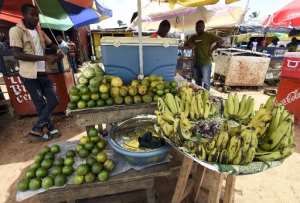
Johannesburg (AFP) - Sub-Saharan Africa's rapid economic growth is set to continue this year and next, but Ebola and budget problems have exposed the region's vulnerabilities, the IMF said on Tuesday.
Forecasting 5.1 percent growth this year and 5.8 percent in 2015 -- the fastest growth outside Asia -- the Washington-based institution warned "the Ebola virus is exacting a heavy economic toll."
More than 3,000 people have died as a result of the illness which is squeezing trade links between Guinea, Liberia and Sierra Leone, and the rest of the world.
"Should the Ebola outbreak become more protracted or spread to more countries, it would have dramatic consequences for economic activity in the west African region," the International Monetary Fund said.
Meanwhile unrest and insecurity in Central African Republic and South Sudan continues to have a destabilising effect.
Other risks for the region were more run-of-the-mill but equally stark, with many governments such as the one in South Africa borrowing and importing more than they can afford.
"In contrast to robust activity in much of the region, growth in South Africa has remained lacklustre, dragged down by protracted strikes, low business confidence, and tight electricity supply," the IMF said in its latest review of the world economy.
South Africa, Democratic Republic of Congo, Ethiopia, Ghana, Kenya, Senegal, Tanzania and Uganda are all running big current account deficits.
For now, investors seem happy to largely overlook those fiscal red flags, but the IMF warned that attitudes can change quickly.
It cautioned against an "overreliance on volatile capital flows."
The region "has become more sensitive to external real and financial shocks, given its increasing global linkages," the IMF said.
"Lower growth in emerging market economies—notably China—also poses a protracted risk for the region, but especially for countries heavily reliant on commodity exports."
It called on the countries of the region "to pay heed to macroeconomic constraints, avoid overreliance on volatile capital flows, and prevent a permanent widening of the fiscal position."




 Meta releases new version of conversational AI across its platforms
Meta releases new version of conversational AI across its platforms
 Cape Town named Africa’s Best Airport 2024 by Skytrax
Cape Town named Africa’s Best Airport 2024 by Skytrax
 Bono East: Four injured after hearse transporting corpse crashes into a truck
Bono East: Four injured after hearse transporting corpse crashes into a truck
 ‘Be courageous, find your voice to defend our democracy’ — Sam Jonah urges journ...
‘Be courageous, find your voice to defend our democracy’ — Sam Jonah urges journ...
 Exodus of doctors, nurses and teachers have worsened because of unserious Akufo-...
Exodus of doctors, nurses and teachers have worsened because of unserious Akufo-...
 2024 election: Avoid insults, cutting down people in search of power – National ...
2024 election: Avoid insults, cutting down people in search of power – National ...
 ‘You passed through the back door but congratulations’ — Atubiga on Prof Jane Na...
‘You passed through the back door but congratulations’ — Atubiga on Prof Jane Na...
 Government’s $21.1 billion added to the stock of public debt has been spent judi...
Government’s $21.1 billion added to the stock of public debt has been spent judi...
 Akufo-Addo will soon relocate Mahama’s Ridge Hospital to Kumasi for recommission...
Akufo-Addo will soon relocate Mahama’s Ridge Hospital to Kumasi for recommission...
 We must not compromise on our defence of national interest; this is the time to ...
We must not compromise on our defence of national interest; this is the time to ...
